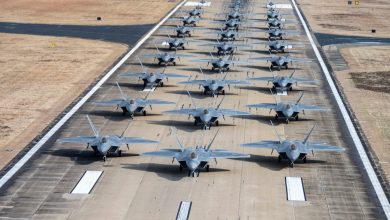Defense tech firms establish AI-focused consortium
Palantir and Anduril, two leading defense technology firms, announced today they’re creating an industry consortium to address what they see as hurtles impeding the Defense Department’s adoption of AI.
“Our goal is to deliver the technological infrastructure, from the edge to the enterprise, that can enable our government and industry partners to transform America’s world-leading AI advancements into next-generation military and national security capabilities,” the companies said Friday in joint statement.
Both firms are key players in the Pentagon’s AI and software ecosystem. Palantir builds platforms to analyze and distill data and Anduril develops a range of advanced hardware and software systems largely centered on autonomy and AI.
The companies are teamed on the Army’s Tactical Intelligence Targeting Access Node program, an integrated, AI-defined targeting system set to begin fielding over the next two years.
Palantir also provides the core software enabling the Army’s data platform that supports leaders across the force to provide overall visibility and support rapid decision-making — a contract it’s had since 2017. The Army uses it for unit readiness, managing combat power, logistics and installations and even recruiting.
Anduril, meanwhile, is providing hardware and software for the Pentagon’s Replicator initiative, which aims to field thousands of small, networked drones by next August.
For this new partnership, the companies will build on existing product lines, including Palantir’s AI Platform, AIP, and Anduril’s Menace, a software-defined command and control system.
The goal is to address two key problems they see as inhibiting the U.S. military’s adoption of AI: data readiness and the lack of a secure pipeline for scaling industry’s AI models.
To get after the second problem, the team plans to use AIP to deliver a cloud-based data management capability that can deliver AI data at all classification levels. They also plan to combine Palantir’s Maven Smart System with Anduril’s Lattice software to provide “a seamless operational capability” for developing and fielding new AI tools across the defense enterprise.
“This platform is already in place and in use by Anduril and Palantir for their own corporate purposes, and with government contracts that enables this work to begin immediately,” the companies said.
The plan is ultimately to grow the partnership to include more firms.
News of the consortium comes amid announcements of several other industry collaborations involving the two companies. Anduril said Thursday it would team with ChatGPT-maker OpenAI to use AI algorithms to improve the military’s counter-drone capabilities.
And Palantir announced today it is joining forces with Booz Allen Hamilton to advance defense innovation among U.S. allies. That partnership focuses on modernizing defense infrastructure and using data-centric tools to improve collaboration among partner nations.
Maintaining tech competition
Two U.S. senators this week, meanwhile, introduced legislation that calls for the Defense Department to implement guardrails to maintain competition for major technology development programs.
The bill — championed by Sen. Elizabeth Warren, D-Mass, and Sen. Eric Schmitt, R-Mo. — targets DOD’s AI and cloud computing programs, portfolios that it says are dominated by a handful of Silicon Valley companies.
“Right now, all of our eggs are in one giant Silicon Valley basket. That doesn’t only stifle innovation, but it’s more expensive and it seriously increases our security risks,” Warren said in a statement. “Our new bill will make sure that as the Department of Defense keeps expanding its use of AI and cloud computing tools, it’s making good deals that will keep our information secure and our government resilient.”
Specific provisions in the bill include a requirement that DOD conduct an open competition for any AI or data integration programs with annual contracts worth at least $50 million.
It would also direct the Pentagon’s Chief Digital and AI Office to ensure that any government data used to build or operate the military AI tools be secured and protected — particularly if it’s being stored alongside vendor data.
Land warfare reporter Jen Judson contributed to this story.
Courtney Albon is C4ISRNET’s space and emerging technology reporter. She has covered the U.S. military since 2012, with a focus on the Air Force and Space Force. She has reported on some of the Defense Department’s most significant acquisition, budget and policy challenges.
Read the full article here






